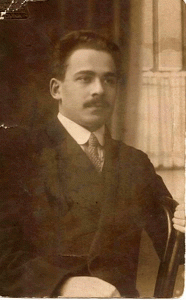The Alexander Macht Chess Tournament will be held at the Lithuanian Jewish Community at Pylimo street No. 4 at 6:00 P.M. on Sunday, October 18. The tournament was organized by the LJC and the elite chess and checkers clubs Rositsan and Maccabi.
Boris Rositsan gave the LJC website a small interview in the run-up to the tournament where, he said, at least 30 people are planning to play. Special medals have been ordered for this competition.
What does the name Alexander Macht signify?
Boris Rositsan: Alexander Macht is an historical figure and a very important person in the history of Lithuanian chess as well as Jewish. We cannot forget this sort of person, so we are continuing the tradition of tournaments. In interwar Lithuania he was Lithuanian champion seven times over. Macht lived in Kaunas and was director of the Jewish People’s Bank. He went to Israel in 1935 and directed the famous Bank Leumi there. No one wrote, said or remembered anything at all about this great chess player during the Soviet period. We have prepared a program dedicated to Litvak chess players. After we presented our book “Žydai Lietuvos šachmatų istorijoje” [“Jews in Lithuanian Chess History”] at the beginning of this year, LJC chairwoman Faina Kukliansky asked us why weren’t continuing that history. I would like to say that we are preparing to do just that in cooperation with the community. We are holding two tournaments, this is for adults, but if strong young chess players come forward, we will include them. On October 31st there will be a tournament dedicated to the memory of Itzhak Vistinietzki [Isakas Vistaneckis] and children will play in that. We are inviting children aged five and over to come and learn to play chess. We have student groups at the community for the ages of 5, 6, 7… and 13 years old. Also, elderly and retired LJC members are coming to us. Fishman is helping me with the training. Serious work is taking place, non-commercial, I really love chess and I want to revive the LJC chess movement.
When did you become interested in the history of Litvak chess, about which the public has no information at all?
Boris Rositsan: I was friends with the history teacher Eugenijus Paleckis who was interested in the history of chess. That was eight years ago. We used to talk. I decided we should write a book. I maintained contact with all chess players from Lithuania, no matter where they live now. Paleckis and I began to work intensively together. My job was to come up with photos and documents about pre-war tournaments. I played for many years in Lithuania, and I knew there was a person named Alexander Macht, but I never heard anything about him during the Soviet period or after. It was difficult finding material. His relatives in Israel gave me a contact for his granddaughter in Canada. She lived with her famous grandfather for eleven years. When we went to the Maccabiada [Maccabiah Games in Israel] for the first time in 1989, I met with Vistinietzki and learned a lot from him, and kept on looking. I think we have to remember Jewish chess history, its contribution to the Lithuanian sport of chess is tremendous.
I came up with the thought of holding a tournament in memory of Alexander Macht. The first tournament was held in 2013, my brother and I organized it together. World champion Boris Spassky participated at that well-organized tournament. Embassy staff observed the tournament. After that, this year, when I presented my book “Žydai Lietuvos šachmatų istorijoje,” the March 11 Signatories Cup tournament was being held at the Lithuanian parliament. We spoke a lot there about the history of Lithuanian chess. Nine years ago the Lithuanian Jewish Community started their own club, Makabi, and for several years I supported the tournaments and training sessions at the Lithuanian Jewish Community. Now, continuing chess tradition, we are doing training at the community twice per week, on Wendesday and Saturday. We have prepared a plan for competitions in the future.
Ilona Rūkienė interviewed Boris Rositsan

Alexander Macht, courtesy of the Macht family website

